An engine is a complex machine. In order for it to run smoothly, all of its parts need to be in good working condition and use the correct type of oil. Many people are not aware that using the wrong oil in their car can have serious consequences.
The oil is responsible for lubricating and cooling the engine, so when it is not the correct type or is old, it can lead to a number of problems, from decreased performance to serious damage that can cost you a lot of money to repair.
So what are some wrong oil in car symptoms? The most common symptoms of using the wrong oil in car are an oil leak and burning oil smells.
In this blog post, we’ll discuss more wrong oil in car symptoms and how to fix them. We’ll also provide tips on how to prevent this from happening in the future. So whether you’re a seasoned mechanic or just starting to learn about cars, read on for everything you need to know about wrong oil in a car!
What's in this post?
What are wrong oil in car symptoms?
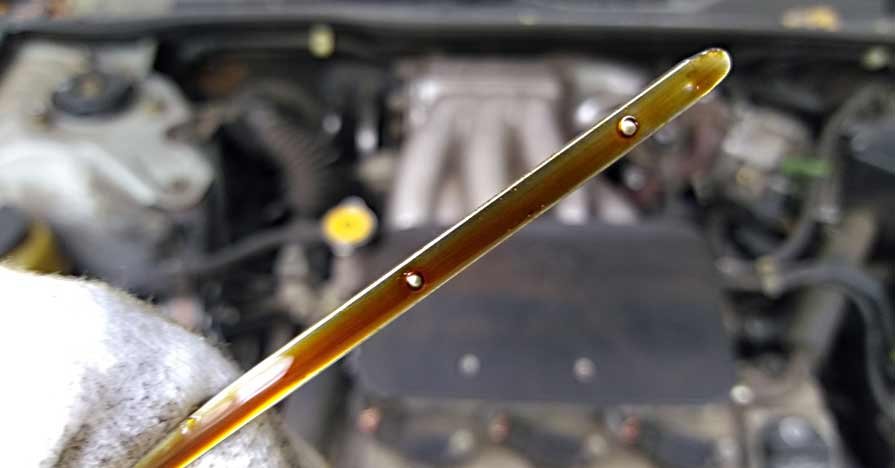
Now that we’ve discussed some of the basics of engine oil, let’s take a look at what can happen if you use the wrong oil in your car.
Oil leak
If you use the wrong type of oil in your car, it can cause an oil leak. The wrong oil won’t be able to properly lubricate the engine parts, and over time, this can lead to wear and tear.
In some cases, the oil might not be compatible with the seals in the engine, which can cause them to break down and leak.
Burning oil smells
Another symptom of using the wrong oil in your car is a burning oil smell. If the oil isn’t compatible with the engine, it can start to break down and produce a burning smell.
This is often accompanied by smoke coming from the engine bay.
Hard to start in cold weather
Many car owners are unaware of the importance of using the correct oil in their vehicles. Using the wrong oil can have a number of negative consequences, one of which is difficulty starting the car in cold weather.
The oil in your car plays an important role in lubricating the engine, and different oils have different thicknesses. Thicker oils are better for high temperatures, while thinner oils are better for cold weather.
When the wrong oil is used, it can cause excessive wear on engine parts and make it difficult for the engine to turn over in cold weather. As a result, it is important to consult your owner’s manual to determine which oil is best for your car and to make sure that you always use the correct oil.
Decreased fuel economy
Another symptom of using the wrong oil in your car is decreased fuel economy. The wrong oil can make the engine work harder, which can lead to a decrease in fuel efficiency. In addition, using the wrong oil can lead to build-up and deposits, which can reduce efficiency and cause your engine to run less smoothly.
If you notice that your fuel economy has decreased and you suspect that it might be due to the oil, consult your owner’s manual or take your car to a mechanic to have it checked out.
Engine knocking
A final symptom of using the wrong oil in your car is engine knocking. Engine knocking is a knocking noise that you may hear when your car is running. It is caused by the build-up of pressure in the engine, and it can damage the engine over time. One of the main reasons for this build-up of pressure is using the wrong oil in your car.
The wrong oil will not lubricate the engine as well, and it can also lead to deposits forming on the piston rings. This can cause the engine to run hotter, which will increase the pressure even further. Ultimately, using the wrong oil in your car can lead to serious damage to the engine, so it is important to make sure that you use the correct oil for your vehicle.
How to fix wrong oil in car
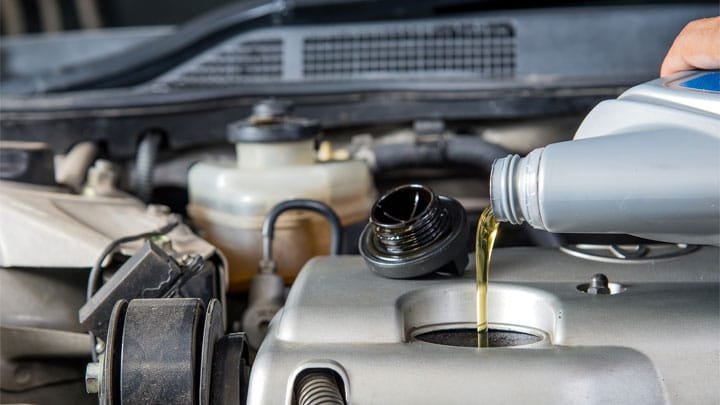
If you’ve put the wrong oil in your car, there are a few things you can do to fix the problem.
The first thing you need to do is check your owner’s manual to see what type of oil your car requires. Once you know what type of oil your car needs, you can purchase the correct oil and change it yourself or take it to a mechanic to have it done.
If you’ve already driven your car with the wrong oil, you’ll need to have the oil changed as soon as possible. The sooner you change the oil, the less damage will be done to your engine.
You should also have your engine checked by a mechanic to make sure that there is no damage. If there is damage, a mechanic can help you fix it.
Common mistakes when changing oil

Now that we’ve gone over some of the symptoms of using the wrong oil in your car, let’s discuss some of the most common mistakes people make when changing their oil.
Use synthetic oil with conventional motor oil
One of the most common mistakes people make when changing their oil is using synthetic oil with conventional motor oil. Synthetic oil is designed for use in engines that require it, and using it in an engine that doesn’t require it can cause problems.
If you use synthetic oil in an engine that requires conventional motor oil, the synthetic oil will not be able to lubricate the engine properly. This can lead to increased wear and tear on the engine and decreased fuel economy.
Mix different oil weights
Another common mistake people make when changing their oil is mixing different oil weights. Different oils have different thicknesses, and using a thinner oil in an engine that requires a thicker oil can cause problems.
Thinner oils are designed for use in engines that run at high temperatures, while thicker oils are designed for use in engines that run at lower temperatures.
If you use a thinner oil in an engine that requires thicker oil, the engine will not be lubricated properly and it can lead to increased wear and tear.
Mix different oil brands
Finally, another common mistake people make when changing their oil is mixing different oil brands. Different oils have different formulations, and using a different brand of oil can cause problems.
If you use a different brand of oil in your car, the new oil may not be compatible with the old oil. This can lead to deposits and build-up, which can reduce the efficiency of your engine and cause it to run less smoothly.
If you need to switch brands of oil, consult your owner’s manual or take your car to a mechanic to have it checked out first.
How to choose the right oil for your car
When it comes to choosing the right oil for your car, there are a few things you need to take into consideration.
First, you need to check your owner’s manual to see what type of oil is recommended for your specific make and model.
Once you’ve determined the right type of oil, you need to decide on the weight. The weight is based on the temperature range in your area. If you live in an area with extreme temperatures, you’ll need to choose an oil with a higher weight.
Finally, you need to decide how often you want to change your oil.
Depending on your driving habits, you may need to change your oil more or less frequently. Once you’ve considered all of these factors, you should be able to choose the right oil for your car.
Type of engine oil service
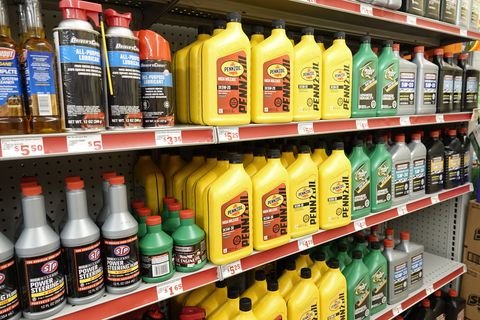
There are two main types of engine oil service classifications: gasoline engines and diesel engines.
Gasoline engines typically use a higher grade of oil, while diesel engines usually require a lower grade. The reason for this is that gasoline engines operate at higher temperatures and pressures than diesel engines, making them more susceptible to wear and tear. As a result, gasoline engines need a more robust oil that can withstand the higher temperatures and pressures.
Conversely, diesel engines typically run cooler and at lower speeds than gasoline engines, so they don’t require an oil that can withstand as much stress. As a result, most diesel engines can use a lower grade of oil.
When choosing an engine oil for your vehicle, be sure to consult your owner’s manual to ensure that you select the right grade for your engine type.
Oil Viscosity

Oil viscosity is a measure of an oil’s resistance to flow. The higher the viscosity, the thicker the oil and the slower it flows. oils with high viscosity are often used in high-performance applications where they can help to improve engine efficiency and power. Viscosity also affects an oil’s ability to lubricate moving parts and protect them from wear.
In general, thicker oils provide better protection but may also increase fuel consumption. Thinner oils, on the other hand, tend to flow more easily but may not provide as much protection. Oil viscosity is therefore an important factor to consider when choosing an oil for your car.
Oil viscosity is affected by both cold weather and hot weather. Cold weather increases an oil’s viscosity, due to the lower temperatures causing the oil to thicken and flow more slowly. This can cause problems for engines, as the oil may not reach all the moving parts or may not flow fast enough to lubricate them properly.
Hot weather, on the other hand, decreases an oil’s viscosity. This can lead to leaks, as the oil may become too runny and start to seep out of seals and gaskets. It is therefore important to choose an oil with the appropriate viscosity for the operating conditions of your engine.
Most oils have a viscosity rating that is expressed as a number followed by the letter “W.” The number indicates the oil’s viscosity at low temperatures, while the “W” stands for “winter.”
For example, an 5W-20 oil has a viscosity of 5 at low temperatures and 20 at normal operating temperatures. When shopping for oil, be sure to select the type that is recommended for your car. Using the wrong oil can cause engine damage or poor performance.
FAQs about wrong oil in car symptoms
Is there a big difference between 5w20 and 5W-30?
A big difference between 5w20 and 5W-30 is that the former is a champion in colder climates while the latter is also a champion in hotter climates where a thick oil is needed to withstand the higher temperatures.
5W-30 has a higher viscosity, meaning it can maintain its thickness at higher temperatures without becoming runny, while 5W-20’s lower viscosity allows it to better flow in cold weather and start engines more readily when it’s cold out. In terms of protection, both oils will protect your engine from wear and tear.
However, 5W-30 does provide slightly better protection against high temperatures and high fuel pressures. It’s ultimately up to you to decide which oil is best for your car based on the climate you live in and your driving habits. If you’re not sure, consult your car’s owner’s manual or a professional mechanic.
Is it better to use thicker oil in high mileage engine?
As a car’s engine rack up the miles, it starts to experience increased wear and tear. This is due to the fact that metal parts begin to break down and rub together, causing friction. To help offset this problem, many carmakers recommend using thicker oil in high mileage engines.
The thicker oil helps to create a barrier between moving parts, reducing friction and helping to prevent engine damage. In addition, thicker oil is better able to withstand the heat generated by a high mileage engine, meaning that it can do a better job of protecting vital components. As a result, using thicker oil in a high mileage engine can help to extend its lifespan.
What is considered high mileage for a used car?
The standard guideline for what is considered high mileage for a used car is 12,000 miles per year. This means that if a car has been driven more than 12,000 miles in a single year, it is considered high mileage.
Is 10W-40 better than 5W-30?
The choice of oil for your car depends on a few factors, including the climate you live in and the manufacturer’s recommendations. In general, 5W-30 oil is a good all-purpose oil that can be used in most climates. It has a lower viscosity than 10W-40 oil, which means it flows more readily at lower temperatures. This can be beneficial in cold weather, when engine parts are more likely to be stiff and difficult to turn.
However, the 10W-40 oil has a higher viscosity, which means it can provide better protection for engine parts in hot weather. It can also be a good choice for high-performance engines that run at higher temperatures. Ultimately, the best oil for your car depends on your specific needs and driving conditions. Consult your owner’s manual or a qualified mechanic to determine the best oil for your car.
Can I switch back from synthetic to regular oil?
The short answer is yes, you can switch from synthetic to regular oil. However, there are a few things you should keep in mind before making the switch.
First, synthetic oil is designed to last longer than regular oil. As a result, it may not need to be changed as often. If you switch to regular oil, you may need to change your oil more frequently.
Second, synthetic oil can provide superior performance in terms of fuel economy and engine protection. However, it is also more expensive than regular oil. As a result, car owners may be tempted to mix the two oils in order to save money.
While this practice is unlikely to cause any immediate problems, it could reduce the overall lifespan of your engine. In addition, synthetic oil may not provide the same level of protection as regular oil, so it is important to consult your owner’s manual before mixing the two oils.
Conclusion
If you’ve noticed any of the wrong oil in car symptoms we’ve described, it’s important to take action right away. The longer you wait, the more damage your car will sustain. Be sure to consult a professional mechanic to get an accurate diagnosis and determine the best course of action for your individual situation.
Preventing wrong oil in car from happening is much easier than dealing with the consequences. Be sure to always check your owner’s manual for the correct type of oil to use and be mindful of how long you’ve been driving before changing it. By following these simple tips, you can keep your car running smoothly for years to come!



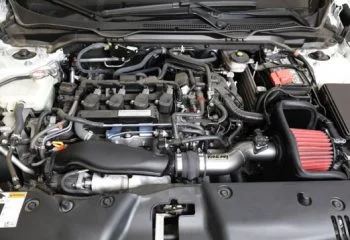

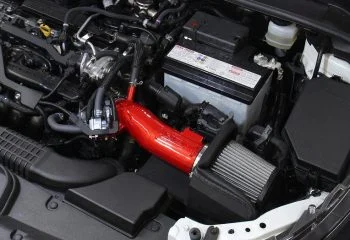
Simply put, if you use the wrong viscosity motor oil, it may break down faster than normal.
True